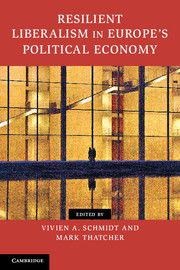Book contents
- Frontmatter
- Contents
- List of figures
- List of tables
- List of contributors
- Preface
- 1 Theorizing ideational continuity: The resilience of neo-liberal ideas in Europe
- Part I Economy, state, and society
- Part II Neo-liberalism in major policy domains
- Part III Neo-liberalism in comparative perspective
- 10 The resilience of Anglo-liberalism in the absence of growth: The UK and Irish cases
- 11 Germany and Sweden in the crisis: Re-coordination or resilient liberalism?
- 12 State transformation in Italy and France: Technocratic versus political leadership on the road from non-liberalism to neo-liberalism
- 13 Reassessing the neo-liberal development model in Central and Eastern Europe
- Part IV Conclusion
- Index
- References
10 - The resilience of Anglo-liberalism in the absence of growth: The UK and Irish cases
Published online by Cambridge University Press: 05 June 2014
- Frontmatter
- Contents
- List of figures
- List of tables
- List of contributors
- Preface
- 1 Theorizing ideational continuity: The resilience of neo-liberal ideas in Europe
- Part I Economy, state, and society
- Part II Neo-liberalism in major policy domains
- Part III Neo-liberalism in comparative perspective
- 10 The resilience of Anglo-liberalism in the absence of growth: The UK and Irish cases
- 11 Germany and Sweden in the crisis: Re-coordination or resilient liberalism?
- 12 State transformation in Italy and France: Technocratic versus political leadership on the road from non-liberalism to neo-liberalism
- 13 Reassessing the neo-liberal development model in Central and Eastern Europe
- Part IV Conclusion
- Index
- References
Summary
Introduction
This chapter examines the origins, sustenance, and puncturing of the growth dynamic enjoyed by the United Kingdom and Ireland since the early 1990s. Often classified as ‘liberal market economies’, these two economies are particularly well matched for purposes of comparative analysis. They share not only a common legacy but also key structural similarities, such as their high levels of trade openness, their dependence on foreign direct investment, their membership in the EU (both since 1973), their flexible labour-market regimes (at least by European standards), their shared ‘liberal’ welfare tradition, and – of course – their common language. Yet, there are also notable differences between the two countries – not only in terms of their economic size and relative influence on the international stage but also their rather different and distinctive political traditions. For example, from 1987 onwards, Irish macroeconomic policy has been guided by ‘social-partnership’ agreements between the government and key social and economic interests, which have stood in stark contrast to the British system of free-collective bargaining. Given these differences and the path-dependent nature of political discourse, there might be strong reasons for anticipating divergent ideational and institutional responses even to common pressures and imperatives. Yet, as discussed in this chapter, there are striking similarities between the two countries in the development of political discourse and public policy in response to the crisis in recent years.
- Type
- Chapter
- Information
- Resilient Liberalism in Europe's Political Economy , pp. 289 - 312Publisher: Cambridge University PressPrint publication year: 2013
References
- 13
- Cited by

